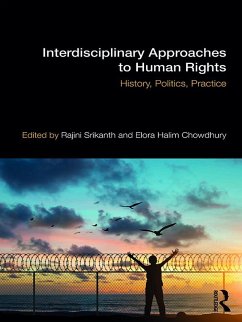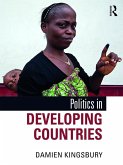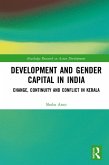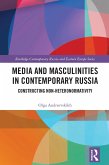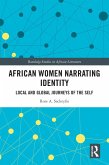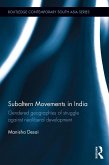Interdisciplinary Approaches to Human Rights (eBook, PDF)
History, Politics, Practice
Redaktion: Srikanth, Rajini; Chowdhury, Elora Halim
40,95 €
40,95 €
inkl. MwSt.
Sofort per Download lieferbar

20 °P sammeln
40,95 €
Als Download kaufen

40,95 €
inkl. MwSt.
Sofort per Download lieferbar

20 °P sammeln
Jetzt verschenken
Alle Infos zum eBook verschenken
40,95 €
inkl. MwSt.
Sofort per Download lieferbar
Alle Infos zum eBook verschenken

20 °P sammeln
Interdisciplinary Approaches to Human Rights (eBook, PDF)
History, Politics, Practice
Redaktion: Srikanth, Rajini; Chowdhury, Elora Halim
- Format: PDF
- Merkliste
- Auf die Merkliste
- Bewerten Bewerten
- Teilen
- Produkt teilen
- Produkterinnerung
- Produkterinnerung

Bitte loggen Sie sich zunächst in Ihr Kundenkonto ein oder registrieren Sie sich bei
bücher.de, um das eBook-Abo tolino select nutzen zu können.
Hier können Sie sich einloggen
Hier können Sie sich einloggen
Sie sind bereits eingeloggt. Klicken Sie auf 2. tolino select Abo, um fortzufahren.

Bitte loggen Sie sich zunächst in Ihr Kundenkonto ein oder registrieren Sie sich bei bücher.de, um das eBook-Abo tolino select nutzen zu können.
Interdisciplinary Approaches to Human Rights is an edited collection which brings together analyses of human rights work from multiple disciplines.
- Geräte: PC
- mit Kopierschutz
- eBook Hilfe
- Größe: 3.43MB
Andere Kunden interessierten sich auch für
![Politics in Developing Countries (eBook, PDF) Politics in Developing Countries (eBook, PDF)]() Damien KingsburyPolitics in Developing Countries (eBook, PDF)41,95 €
Damien KingsburyPolitics in Developing Countries (eBook, PDF)41,95 €![Culture and Conflict in Palestine/Israel (eBook, PDF) Culture and Conflict in Palestine/Israel (eBook, PDF)]() Culture and Conflict in Palestine/Israel (eBook, PDF)42,95 €
Culture and Conflict in Palestine/Israel (eBook, PDF)42,95 €![Development and Gender Capital in India (eBook, PDF) Development and Gender Capital in India (eBook, PDF)]() Shoba ArunDevelopment and Gender Capital in India (eBook, PDF)46,95 €
Shoba ArunDevelopment and Gender Capital in India (eBook, PDF)46,95 €![Media and Masculinities in Contemporary Russia (eBook, PDF) Media and Masculinities in Contemporary Russia (eBook, PDF)]() Olga AndreevskikhMedia and Masculinities in Contemporary Russia (eBook, PDF)39,95 €
Olga AndreevskikhMedia and Masculinities in Contemporary Russia (eBook, PDF)39,95 €![African Women Narrating Identity (eBook, PDF) African Women Narrating Identity (eBook, PDF)]() Rose A. SackeyfioAfrican Women Narrating Identity (eBook, PDF)40,95 €
Rose A. SackeyfioAfrican Women Narrating Identity (eBook, PDF)40,95 €![Subaltern Movements in India (eBook, PDF) Subaltern Movements in India (eBook, PDF)]() Manisha DesaiSubaltern Movements in India (eBook, PDF)46,95 €
Manisha DesaiSubaltern Movements in India (eBook, PDF)46,95 €![Interdisciplinary Approaches to Human Communication (eBook, PDF) Interdisciplinary Approaches to Human Communication (eBook, PDF)]() Interdisciplinary Approaches to Human Communication (eBook, PDF)46,95 €
Interdisciplinary Approaches to Human Communication (eBook, PDF)46,95 €-
-
-
Interdisciplinary Approaches to Human Rights is an edited collection which brings together analyses of human rights work from multiple disciplines.
Hinweis: Dieser Artikel kann nur an eine deutsche Lieferadresse ausgeliefert werden.
Dieser Download kann aus rechtlichen Gründen nur mit Rechnungsadresse in A, B, BG, CY, CZ, D, DK, EW, E, FIN, F, GR, HR, H, IRL, I, LT, L, LR, M, NL, PL, P, R, S, SLO, SK ausgeliefert werden.
Hinweis: Dieser Artikel kann nur an eine deutsche Lieferadresse ausgeliefert werden.
Produktdetails
- Produktdetails
- Verlag: Taylor & Francis eBooks
- Seitenzahl: 368
- Erscheinungstermin: 30. Oktober 2018
- Englisch
- ISBN-13: 9781351058421
- Artikelnr.: 54673179
- Verlag: Taylor & Francis eBooks
- Seitenzahl: 368
- Erscheinungstermin: 30. Oktober 2018
- Englisch
- ISBN-13: 9781351058421
- Artikelnr.: 54673179
- Herstellerkennzeichnung Die Herstellerinformationen sind derzeit nicht verfügbar.
Rajini Srikanth is Professor of English and Dean of the Honors College at the University of Massachusetts Boston, USA. Her research interests include the intersection between literature and human rights, post-apartheid South Africa, comparative race and ethnic studies, and Asian American literature. Her recent publications include Constructing the Enemy: Empathy/Antipathy in US Literature and Law (2012) and The Cambridge History of Asian American Literature (2016). Elora Halim Chowdhury is Professor and Chair of Women's, Gender and Sexuality Studies at the University of Massachusetts Boston, USA. Her research interests include transnational feminisms, film and culture, and human rights narrative with an emphasis on South Asia. Her recent publications include Transnationalism Reversed: Women Organizing against Gendered Violence in Bangladesh (2011) and Dissident Friendships: Feminism, Imperialism and Transnational Solidarity (2016).
Introduction; Part I. Human Rights Discourse: Context and History; Chapter
1: Imaginary and Real Strangers: Constructing and Reconstructing the Human
in Human Rights Discourse and Instruments; Chapter 2: Rise of the Global
Human Rights Regime: Challenging Power with Humanity; Chapter 3: Between
Nothingness and Infinity: Settlement and Anti-Blackness as the
Overdetermination of Human Rights; Chapter 4: Human Rights, Latin America,
and Left Internationalism during the Cold War; Chapter 5: Women, Gender,
and Human Rights; Chapter 6: The United States-Mexico Border and Human
Rights; Chapter 7: Unintended Consequences in the Postcolonies: When
Struggling South Africans Experience Rights Discourse As Disempowering
Part II. Critical Areas in Human Rights; Chapter 8: The Mysterious
Disappearance of Human Rights in the 2030 Development Agenda; Chapter 9:
Addressing General Recommendation No. 35 from an Intersectional Perspective
on Violence, Gender and Disability in Mexico; Chapter 10: Global LGBTQ
politics and Human Rights; Chapter 11: Refugee Camps and the (Educational)
Rights of the Child; Chapter 12: Persistent Voices: A History of Indigenous
People and Human Rights in Australia, 1950s-2000s; Part III. Praxis and
Human Rights; Chapter 13: So You Want to Work in Human Rights?; Chapter 14:
Migrant Workers in the Gulf: Theoretical and Human Rights Dilemmas; Chapter
15: Ethical Reckoning: Theorizing Gender, Vulnerability and Agency in
Bangladesh Muktijuddho Film; Chapter 16: Right Now in No Place with
Strangers: Eudora Welty's Queer Love; Chapter 17: On The Human Right to
Peace in Times of Contemporary Colonial Power; Chapter 18: Beyond Dignity:
A Case Study of the Mis/Use of Human Rights Discourse in Development
Campaigns; Chapter 19: Teaching Health and Human Rights in a Psychology
Capstone: Cultivating Connections between Rights, Personal Wellness and
Social Justice; Appendix
1: Imaginary and Real Strangers: Constructing and Reconstructing the Human
in Human Rights Discourse and Instruments; Chapter 2: Rise of the Global
Human Rights Regime: Challenging Power with Humanity; Chapter 3: Between
Nothingness and Infinity: Settlement and Anti-Blackness as the
Overdetermination of Human Rights; Chapter 4: Human Rights, Latin America,
and Left Internationalism during the Cold War; Chapter 5: Women, Gender,
and Human Rights; Chapter 6: The United States-Mexico Border and Human
Rights; Chapter 7: Unintended Consequences in the Postcolonies: When
Struggling South Africans Experience Rights Discourse As Disempowering
Part II. Critical Areas in Human Rights; Chapter 8: The Mysterious
Disappearance of Human Rights in the 2030 Development Agenda; Chapter 9:
Addressing General Recommendation No. 35 from an Intersectional Perspective
on Violence, Gender and Disability in Mexico; Chapter 10: Global LGBTQ
politics and Human Rights; Chapter 11: Refugee Camps and the (Educational)
Rights of the Child; Chapter 12: Persistent Voices: A History of Indigenous
People and Human Rights in Australia, 1950s-2000s; Part III. Praxis and
Human Rights; Chapter 13: So You Want to Work in Human Rights?; Chapter 14:
Migrant Workers in the Gulf: Theoretical and Human Rights Dilemmas; Chapter
15: Ethical Reckoning: Theorizing Gender, Vulnerability and Agency in
Bangladesh Muktijuddho Film; Chapter 16: Right Now in No Place with
Strangers: Eudora Welty's Queer Love; Chapter 17: On The Human Right to
Peace in Times of Contemporary Colonial Power; Chapter 18: Beyond Dignity:
A Case Study of the Mis/Use of Human Rights Discourse in Development
Campaigns; Chapter 19: Teaching Health and Human Rights in a Psychology
Capstone: Cultivating Connections between Rights, Personal Wellness and
Social Justice; Appendix
Introduction; Part I. Human Rights Discourse: Context and History; Chapter
1: Imaginary and Real Strangers: Constructing and Reconstructing the Human
in Human Rights Discourse and Instruments; Chapter 2: Rise of the Global
Human Rights Regime: Challenging Power with Humanity; Chapter 3: Between
Nothingness and Infinity: Settlement and Anti-Blackness as the
Overdetermination of Human Rights; Chapter 4: Human Rights, Latin America,
and Left Internationalism during the Cold War; Chapter 5: Women, Gender,
and Human Rights; Chapter 6: The United States-Mexico Border and Human
Rights; Chapter 7: Unintended Consequences in the Postcolonies: When
Struggling South Africans Experience Rights Discourse As Disempowering
Part II. Critical Areas in Human Rights; Chapter 8: The Mysterious
Disappearance of Human Rights in the 2030 Development Agenda; Chapter 9:
Addressing General Recommendation No. 35 from an Intersectional Perspective
on Violence, Gender and Disability in Mexico; Chapter 10: Global LGBTQ
politics and Human Rights; Chapter 11: Refugee Camps and the (Educational)
Rights of the Child; Chapter 12: Persistent Voices: A History of Indigenous
People and Human Rights in Australia, 1950s-2000s; Part III. Praxis and
Human Rights; Chapter 13: So You Want to Work in Human Rights?; Chapter 14:
Migrant Workers in the Gulf: Theoretical and Human Rights Dilemmas; Chapter
15: Ethical Reckoning: Theorizing Gender, Vulnerability and Agency in
Bangladesh Muktijuddho Film; Chapter 16: Right Now in No Place with
Strangers: Eudora Welty's Queer Love; Chapter 17: On The Human Right to
Peace in Times of Contemporary Colonial Power; Chapter 18: Beyond Dignity:
A Case Study of the Mis/Use of Human Rights Discourse in Development
Campaigns; Chapter 19: Teaching Health and Human Rights in a Psychology
Capstone: Cultivating Connections between Rights, Personal Wellness and
Social Justice; Appendix
1: Imaginary and Real Strangers: Constructing and Reconstructing the Human
in Human Rights Discourse and Instruments; Chapter 2: Rise of the Global
Human Rights Regime: Challenging Power with Humanity; Chapter 3: Between
Nothingness and Infinity: Settlement and Anti-Blackness as the
Overdetermination of Human Rights; Chapter 4: Human Rights, Latin America,
and Left Internationalism during the Cold War; Chapter 5: Women, Gender,
and Human Rights; Chapter 6: The United States-Mexico Border and Human
Rights; Chapter 7: Unintended Consequences in the Postcolonies: When
Struggling South Africans Experience Rights Discourse As Disempowering
Part II. Critical Areas in Human Rights; Chapter 8: The Mysterious
Disappearance of Human Rights in the 2030 Development Agenda; Chapter 9:
Addressing General Recommendation No. 35 from an Intersectional Perspective
on Violence, Gender and Disability in Mexico; Chapter 10: Global LGBTQ
politics and Human Rights; Chapter 11: Refugee Camps and the (Educational)
Rights of the Child; Chapter 12: Persistent Voices: A History of Indigenous
People and Human Rights in Australia, 1950s-2000s; Part III. Praxis and
Human Rights; Chapter 13: So You Want to Work in Human Rights?; Chapter 14:
Migrant Workers in the Gulf: Theoretical and Human Rights Dilemmas; Chapter
15: Ethical Reckoning: Theorizing Gender, Vulnerability and Agency in
Bangladesh Muktijuddho Film; Chapter 16: Right Now in No Place with
Strangers: Eudora Welty's Queer Love; Chapter 17: On The Human Right to
Peace in Times of Contemporary Colonial Power; Chapter 18: Beyond Dignity:
A Case Study of the Mis/Use of Human Rights Discourse in Development
Campaigns; Chapter 19: Teaching Health and Human Rights in a Psychology
Capstone: Cultivating Connections between Rights, Personal Wellness and
Social Justice; Appendix
